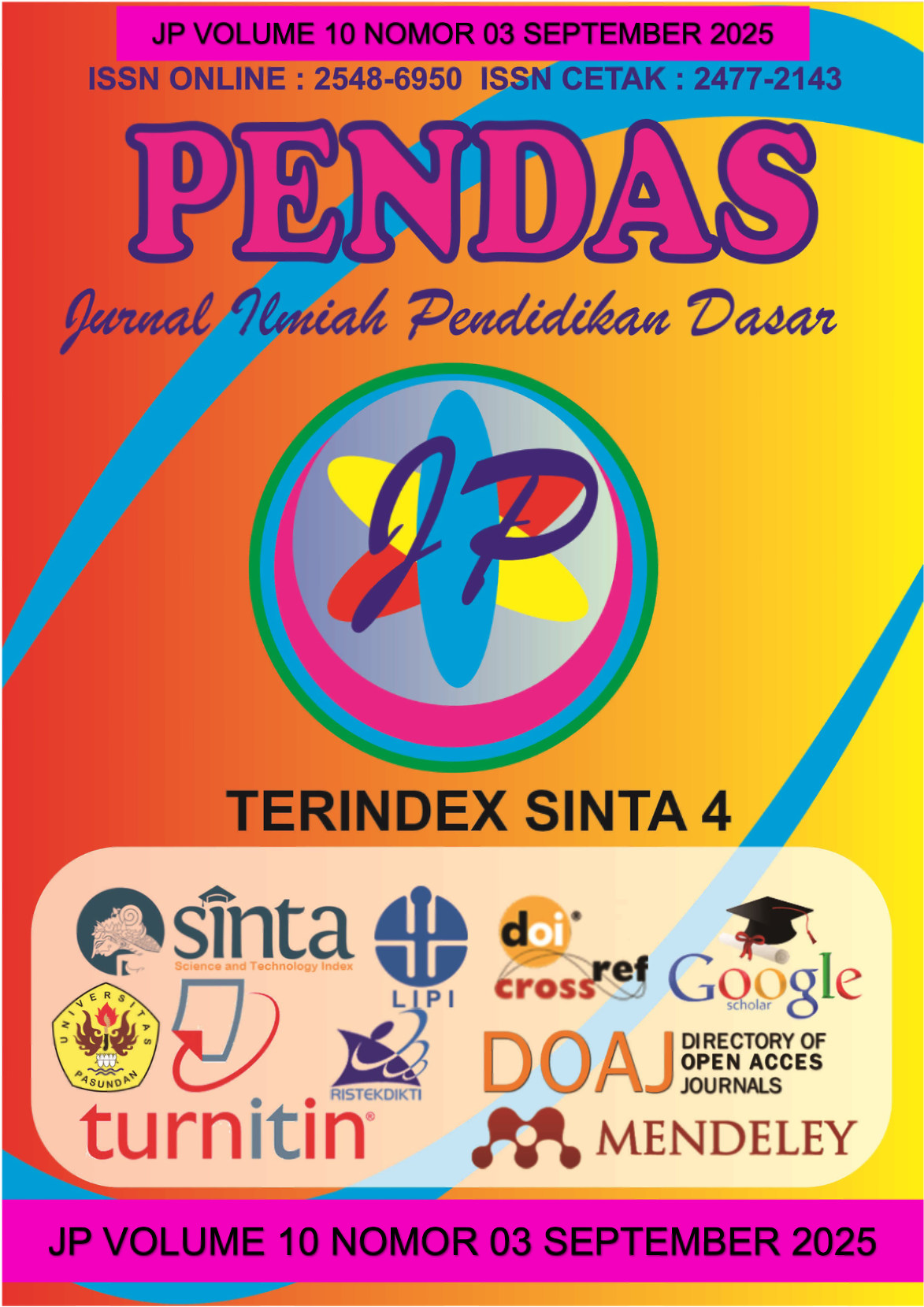PENERAPAN MODEL PEMBELAJARAN KOOPERATIF TIPE STAD (STUDENT TEAM ACHIEVEMENT DIVISION) PADA MATA PELAJARAN IPAS KELAS IV SDN SUKATANI 2 KABUPATEN TANGERANG
DOI:
https://doi.org/10.23969/jp.v10i03.30874Keywords:
STAD Model, Cooperative Learning, IPAS, Student Response, Elementary SchoolAbstract
This study aims to describe the implementation of the Student Team Achievement Division (STAD) cooperative learning model in the subject of Natural and Social Sciences (IPAS) for fourth-grade students at SDN Sukatani 2, Tangerang Regency. It also seeks to analyze students’ responses and identify supporting and inhibiting factors during the implementation process. The background of this research lies in the low level of student engagement in learning and suboptimal academic outcomes caused by the continued use of conventional teaching methods. This research employs a descriptive qualitative approach. The research subjects consist of the fourth-grade teacher and 25 students from the same class. Data were collected through observation, interviews, and documentation. The results show that the STAD model was implemented through well-structured planning, execution, and evaluation phases in alignment with cooperative learning principles. Students responded positively to the model, showing increased participation, confidence, and motivation to learn. Supporting factors included the teacher’s preparedness, student enthusiasm, supportive school environment, and the use of contextual learning media. Meanwhile, challenges faced included unequal participation among group members and time limitations during implementation. Based on these findings, the STAD model is effective in enhancing both the learning process and student engagement at the elementary school level.
Downloads
References
eningkatan Hasil Belajar IPA
Melalui Penerapan Model
Pembelajaran Kooperatif Tipe
STAD Pada Siswa Kelas IV SD
Negeri Badran.” Prosiding
Seminar Nasional Pendidikan
Profesi Guru. Vol. 3. N.p.. 1500–
1507.
Jesmita, J. (2019). Penerapan Model
Pembelajaran Kooperatif Tipe
Stad Untuk Meningkatkan Hasil
Belajar Siswa Di Sekolah Dasar.
Jurnal Basicedu, 3(4), 2137–
2143.
Johnson, D. W., & Johnson, R. T.
(2019). Cooperation and the use
of technology. In Spector, J. M.,
et al. (Eds.), Handbook of
Research on Educational
Communications and
Technology (pp. 401–412).
Listyaningrum, M., & Pratama, A. P.
(2023). Penerapan Model
Pembelajaran Koperatif Type
STAD Dalam Upaya
Meningkatkan Hasil Belajar IPA
Materi Perubahan Lingkungan.
Jurnal Pelita: Jurnal
Pembelajaran IPA Terpadu,
3(1), 29–35.
Meylovia, Donna, and Alfin Julianto.
“Inovasi Pembelajaran IPAS
Pada Kurikulum Merdeka Belajar
Di SDN 25 Bengkulu Selatan.”
Jurnal Pendidikan Islam Al-Affan
4.1 (2023): 84–91. Print.
Peraturan Perundang-undangan.
(2003). Undang-undang (UU)
Nomor 20 Tahun 2003 tentang
Sistem Pendidikan Nasional.
Pemerintah Pusat.
Rosyadi, A., & Arsana, I. M. (2019).
Penerapan Model Pembelajaran
Kooperatif Tipe STAD Untuk
Meningkatkan Hasil Belajar
Siswa Mata Pelajaran AC Mobil
Pada Siswa Kelas XI TKR 1 Di
SMKN 1 Arosbaya Bangkalan.
Jurnal Pendidikan Teknik Mesin,
8(3).
Sudarsana, I. K. G. (2021). Penerapan
pembelajaran kooperatif tipe
STAD untuk meningkatkan hasil
belajar matematika. Indonesian
Journal of Educational
Development (IJED), 2(1), 176–
186.
Sugiyono. (2019). Metode Penelitian
Kuantitatif, Kualitatif, dan R&D.
Penerbit Alfabeta.
Sugiyono. (2021). Metode Penelitian
Kuantitatif, Kualitatif, dan R&D.
Alfabeta.
Downloads
Published
Issue
Section
License
Copyright (c) 2025 Pendas : Jurnal Ilmiah Pendidikan Dasar

This work is licensed under a Creative Commons Attribution 4.0 International License.



















